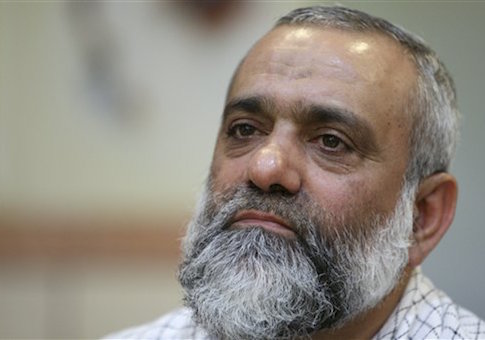A top Iranian general recently visited the Israeli-Syrian border to tour a city on Israel’s doorstep, Iran’s semi-official Fars news agency reported Wednesday, marking the first time the government has publicized a visit by a senior regime official to the area.
General Mohammad Reza Naqdi, commander of the Basij paramilitary force, a massive volunteer organization under the Islamic Revolutionary Guard Corps that performs domestic security functions, traveled to the city of Quneitra in southwest Syria. He also inspected the demarcation line dividing the Golan Heights, a strategic rocky plateau by the border that Israel has controlled since the 1967 Six Day War.
The Fars report did not provide further details on the purpose of the trip or when it took place, only saying the visit occurred "recently." The Basij’s official news agency first reported the story early on Wednesday and released photos of Naqdi looking through binoculars. Regional media outlets noted that the general’s visit marks the first time that Tehran has acknowledged such a trip by a senior Iranian official near the Israeli-Syrian border.
Naqdi’s stop comes after several cross-border incidents between the Syrian army, fighting for embattled President Bashar al-Assad, and the Israel Defense Forces. Two Israeli unmanned aerial vehicles shot two missiles by a residential building in Quneitra on Monday, resulting in no injuries, after a stray mortar fell inside the Golan Heights near Israel’s border.
The Syrian army said in a statement that the strikes are "part of Israel’s direct and public assistance to armed groups [in Syria], in a desperate attempt to raise the groups’ low morale due to the heavy losses that we have caused them ... Such aggressiveness will not deter us from continuing our fight against the Zionist enemy."
On July 17, Israel said its military fired two patriot missiles at an unidentified drone that flew into Israeli airspace from Syria. Officials said they believe the drone was Russian made. Two weeks earlier on July 4, Israel struck two Syrian army targets in the Golan after stray fire damaged the security fence along the demarcation line.
Iran and its proxy Lebanese Hezbollah are heavily invested in Syria, fighting alongside the Syrian military to keep Assad in power against rebel forces, some of which are backed by the United States.
High-ranking Hezbollah commanders have been killed near Qunetira during the Syrian civil war. One Iranian general, Mohammed Ali Allahdadi, was killed in January 2015 by an airstrike along with several other Iranians and six Hezbollah soldiers. Allahdadi was visiting the area to set up missile bases in Syria near the border with Israel to target the Jewish state.
Israeli officials are concerned that Iran and Hezbollah will use the fighting in Syria as a way to set up a new front against Israel in the southern part of the country, and Naqdi’s visit could raise concerns that Tehran is trying again to set up military posts near Quneitra.
The U.S. Treasury Department sanctioned Naqdi in 2011 "for being responsible for or complicit in serious human rights abuses in Iran."
Naqdi oversaw on Sunday the destruction of 100,000 satellite dishes for causing "increased divorce, addiction, and insecurity in society" and for damaging Iran’s Islamic "morality and culture."
